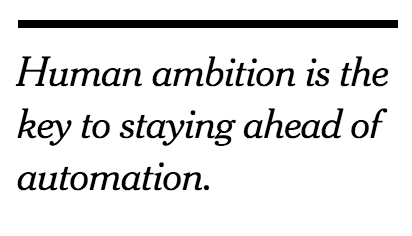

by Garry Kasparov
Read original article at the New York Times
DECEMBER 5, 2016, 3:21 AM
Machines have been replacing humans since the first one was invented many thousands of years ago — and on the very next day, it probably created new jobs when three people were needed to fix it. Humans are adaptable. We’re creative. We use machines to make new things, solve new problems and create whole industries that we can’t yet imagine. Doomsaying is easy and natural. We can see what’s being lost, but we don’t see the new things until they arrive.
 As I learned in my chess matches against the IBM computer Deep Blue 20 years ago, humans will always find a way to build machines that replicate human performance. And while humans still play chess, entire professions will continue to go the way of the elevator operator as machines become more capable. The good news is that intelligent machines also liberate us from tedious labor, letting us be more imaginative and more ambitious — although of course one person’s “liberated” is another person’s “unemployed,” at least in the short term.
As I learned in my chess matches against the IBM computer Deep Blue 20 years ago, humans will always find a way to build machines that replicate human performance. And while humans still play chess, entire professions will continue to go the way of the elevator operator as machines become more capable. The good news is that intelligent machines also liberate us from tedious labor, letting us be more imaginative and more ambitious — although of course one person’s “liberated” is another person’s “unemployed,” at least in the short term.
Human ambition is the key to staying ahead of automation, and that’s what worries me far more than killer robots. The huge increases in productivity that machines provide must be invested aggressively, not squandered. We’re very good at teaching machines how to do our old jobs — so the solution is to keep inventing new ones. The only job security for the human race is to press into the new and the unknown.
Join Opinion on Facebook and follow updates on twitter.com/roomfordebate.
Garry Kasparov, the chairman of the Human Rights Foundation and a former world chess champion, is the author of the forthcoming book, “Deep Thinking.” He is on Twitter (@Kasparov63).

